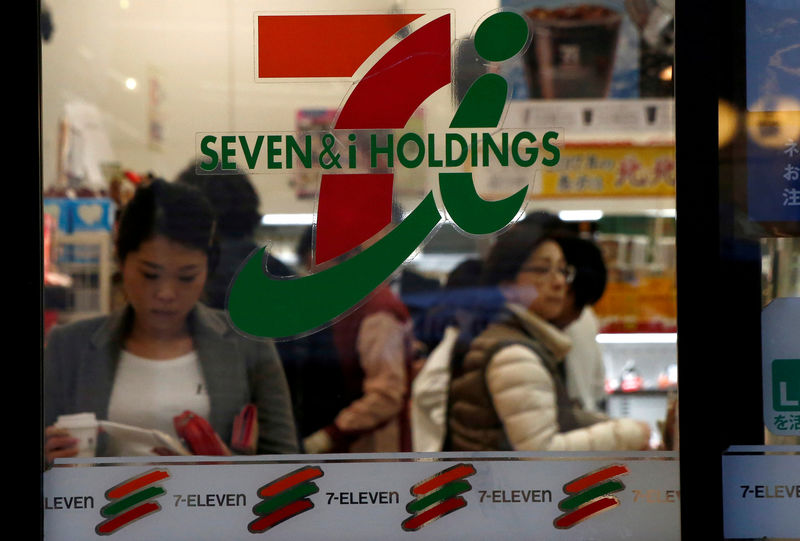By Sam Nussey and Ritsuko Shimizu
TOKYO (Reuters) - Japan's growing labor shortage threatens the nation's ubiquitous convenience stores, whose business model relies on an army of part-timers packing bento lunch boxes, manning cash registers and delivering goods 24/7.
The big three "combini" operators 7-Eleven, FamilyMart and Lawson, which have expanded through Japan's long slump, are scrambling to ease the pressure on franchisees by offering a mix of financial aid and labor-saving automation.
But their earnings outlook is the bleakest in years.
Lawson Inc (T:2651) projects its first drop in profit in 15 years this fiscal year, and 7-Eleven Japan, part of Seven & i Holdings (T:3382), forecasts a meager 0.2 percent increase.
Japan has around 55,000 convenience stores nationwide - roughly one for every 2,300 people - and each store needs around 20 part-timers to run it.
Some shop owners struggling to fill shifts find themselves working some nights as well as during the day.
"The labor situation is starting to get health-hazardous," said one store owner who asked not to be identified.
Restaurant chain Royal Host (T:8179) and McDonald's Japan (T:2702) have begun moving away from 24-hour operations, but so far convenience chains aren't reducing hours or cutting store numbers.
Indeed, all three of the major chains plan to expand. They fear that if they cut back they will lose market share and dent a reputation for catering to customers' needs at any time.
"We are part of the social infrastructure," said Koji Takayanagi, president of FamilyMart UNY Holdings, (T:8028). "We have a mission we must fulfill."
DWINDLING POOL
As Japan's population shrinks, its workforce has declined to 77.2 million in 2015 from a peak of 87.2 million in 1995. By 2065, it's expected to drop to just 45.2 million.
The decline has hit labor-intensive sectors such as delivery services, restaurant chains and retailers especially hard.
The worker crunch started last year, said a Lawson franchisee in Tokyo. Foreigners, many of them university students, are taking up some of the slack, but he predicts the shortages will continue "indefinitely."
Part-time wages, meanwhile, have increased, and some convenience stores have to pay more overtime to fill shifts.
"Labor costs are rising precipitously," Ryuichi Isaka, president of Seven & i Holdings, told a recent earnings briefing.
To ease the burden on store owners, who bear payroll costs, 7-Eleven said it would, for the first time, cut royalty fees it charges franchisees - a measure that will cost the company around 160 billion yen ($1.47 billion) a year.
"We want to turn this into an opportunity to boost store owners' management drive, and attract new owners," Isaka said.
SAVING THE DAY?
The industry hopes technology can overcome the shortfall.
7-Eleven, with 19,423 stores and 390,000 part-timers in Japan, is bringing labor-saving dishwashers to all stores this year, while Lawson is issuing tablet computers to help store management, and installing automatic change counting machines.
The industry also plans to introduce RFID (radio-frequency identification) tags that can track individual items from warehouse to store - hoping this may usher in an era of low-cost distribution networks and unmanned cash registers.
With the government pledging to help roll out the technology by 2025, 7-Eleven estimates RFID tags, which it will trial around August, could save 8 billion yen ($73 million) annually in labor costs.
The increased investment in technology is partly to blame for Lawson's forecast profit decline.
"Rather than simply focusing on increasing profits, we are critically looking at what shape Lawson should take," said company president Sadanobu Takemasu. "By making the necessary investments we will reap the rewards."
The labor-intensive business model is not just in the stores. It extends to a vast network of third-party suppliers and truck crews making deliveries around the clock.
The convenience store industry was built when there were plentiful workers, says Takayuki Suzuki, analyst at Primo Research Japan. But now it "must rationally look again at its excessive and unnecessary services."
-For graphic on 'Japan's ageing population' click: http://tmsnrt.rs/29VjmUo
